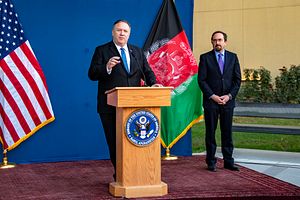The U.S. secretary of state has left Afghanistan without saying whether he was able to broker an agreement between the country’s squabbling political leaders.
Mike Pompeo made the urgent surprise visit to Kabul on Monday, traveling thousands of miles despite a near-global travel shutdown because of the coronavirus pandemic. Afghanistan’s political impasse threatens severely undermine a peace agreement Washington signed with the Taliban last month.
Pompeo met separately with Afghan President Ashraf Ghani and his rival Abdullah Abdullah. Pompeo was urging a compromise be reached in order to jump-start intra-Afghan negotiations with the Taliban, a critical next step to the peace deal.
Talks between Afghans on both sides of the conflict are a critical part of the U.S. peace deal. That deal spells out the withdrawal of U.S. troops over the next 14 months and gives Afghanistan its best chance at peace after decades of war.
Since the signing of the deal, the peace process has stalled amid political turmoil in Afghanistan, with the country’s leaders squabbling over who was elected president.
Ghani and Abdullah, his main rival in last September’s presidential polls, both declared themselves the country’s president in dueling inauguration ceremonies earlier this month.
Pompeo met separately with Ghani and Abdullah before going to meet together with both Afghan leaders. His schedule also had Ghani and Abdullah coming together for a one-on-one meeting, presumably to discuss a possible compromise.
The United States pays billions every year toward the Afghan budget, including the country’s defense forces. Afghanistan barely raises a quarter of the revenue it needs to run the country, giving Pompeo considerable financial leverage to force the two squabbling leaders to overcome the impasse.
The political turmoil has put on hold the start of intra-Afghan peace talks that would include the Taliban. Those talks are seen as a critical next step in the peace deal, negotiated to allow the United States to bring home its troops and give Afghans the best chance at peace.
“We are in a crisis,” a State Department official told reporters accompanying Pompeo. “The fear is that unless this crisis gets resolved and resolved soon, that could affect the peace process, which was an opportunity for this country that (has) stood in this 40-years-long war. And our agreement with the Talibs could be put at risk.”
The official briefed reporters on condition of anonymity to discuss U.S. concerns.
The United States and NATO have already begun to withdraw some troops from Afghanistan. The final pullout of U.S. forces is not dependent on the success of intra-Afghan negotiations but rather on promises made by the Taliban to deny space in Afghanistan to other terror groups, such as the insurgents’ rival Islamic State group.
But within days of the United States and the Taliban signing the peace deal in Qatar on February 29, Afghanistan sunk into a political crisis with Ghani and Abdullah squaring off over election results and Ghani refusing to fulfill his part of a promise made in the U.S.-Taliban deal to free up to 5,000 Taliban prisoners. The insurgents were for their part to free 1,000 Afghan officials and soldiers they hold captive. The exchange was meant to be a good-will gesture by both sides to start the negotiations.
The urgency of Pompeo’s surprise visit was highlighted by the fact that the State Department has warned American citizens against all international travel, citing the spread of the new coronavirus. Pompeo has cancelled at least two domestic U.S. trips because of the outbreak, including one to a now-cancelled G7 foreign ministers meeting that was to have taken place in Pittsburgh this week. That meeting will now take place by video conference.
Pompeo’s last overseas trip in late February was to Doha, Qatar, for the signing of the U.S.-Taliban peace deal he is now trying to salvage.
Washington’s peace envoy Zalmay Khalilzad, who has been trying to jumpstart talks between Afghans on both sides of the conflict — the next critical step in the U.S.-Taliban deal — tweeted early Monday that the two sides are talking about the prisoner exchange.
The intra-Afghan negotiations were never going to be easy but since Washington signed the peace deal with the Taliban, it has struggled to get the Afghan government to at least offer a unified position.
Pompeo’s visit is also extraordinary for the fact that the United States, like the United Nations, had earlier said it would not again be drawn into mediating between feuding Afghan politicians. While the Afghan election committee this time gave the win to Ghani, Abdullah and the election complaints commission charged widespread irregularities to challenge Ghani’s win.
In Afghanistan’s previous presidential election in 2014, also marred by widespread fraud and deeply disputed results, Ghani and Abdullah emerged as leading contenders. Then-U.S. Secretary of State John Kerry mediated between the two and eventually cobbled together a so-called unity government, with Ghani as president and Abdullah holding the newly created but equal in stature post of the country’s chief executive.
However, the Ghani-Abdullah partnership was a difficult one, and for much of its five years triggered a parliamentary paralysis leading up to the September balloting.
By Rahim Faiez and Kathy Gannon for The Associated Press.
Associated Press writer Matt Lee in Washington contributed to this report.

































